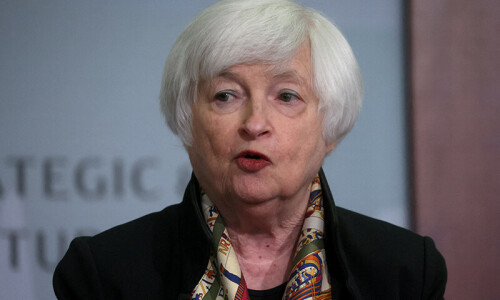
DAVOS, Switzerland: Power in the global economy is shifting from the advanced world to Asia as recovery takes hold, Davos analysts said Wednesday, as political and business elites began their annual meeting.
“What is really happening is a slowdown of the western world and the growth of the emerging markets. This is a complete shift in the balance of power,” Azim Premji, chairman of Indian software major Wipro, told the opening panel.
“In 10 years, the economy of the emerging world will be ... equal or slightly larger than the US economy,” added the billionaire at the World Economic Forum.
China's highest ranking official at the International Monetary Fund, Zhu Min, said that global recovery was still being driven predominantly by Asian giants India and China.
“For the emerging markets, I think growth is very strong. China will still end up with about nine per cent, India will probably grow around eight per cent,” said the former deputy Chinese central bank governor.
A separate survey, meanwhile, showed that the heads of the world's most powerful firms are more bullish than ever on the global economy, with their confidence also being driven by emerging market strength.
A poll of 1,201 chief executives by financial services firm PricewaterhouseCoopers (PwC) showed those surveyed “were nearly as confident of growth this coming year as they've ever been in our survey.” “But with much of Europe and North America still confronting the lingering effects of the downturn, many companies in search of sustainable economic growth are focusing their sights on specific markets far from home.” In all, 92 per cent of Western European CEOs expect growth in their Asian operations, while only 48 per cent expected growth in Europe, the survey showed.
Most panelists agreed that the global economy was significantly healthier than when the elites met last year.
Even New York University professor Nouriel Roubini, dubbed “Dr. Doom” for his normally pessimistic economic outlook, said: “The glass is half empty and half full. There are some positives and some downside risks.” Roubini cited as key downside risks the eurozone debt crisis, a double-dip recession in the US housing market and higher commodity prices leading to social unrest in some areas.
“So, we have a balanced situation with a number of upside risks but also several downside risks ... there are still lots of things that could go wrong.” Social inequality between the haves and the have-nots both in advanced economies and developing countries will be a key future risk, the analysts predicted, pointing to rising tensions in North Africa and the Middle East.
“The increase in inequality is the most serious challenge for the whole world, both for the emerging markets and for the advanced one ... I don't think the world has paid enough attention to this,” said Zhu.
And while much of the talk revolved around Asian powerhouses China and India, some cautioned that the advanced world ignores other emerging markets at its peril.
Martin Sorrell, Chief Executive of WPP, the world's second-biggest advertising group, told the panel: “This is not just a shift from West to East but also from West to South.” “This is the decade of Latin America, with Brazil holding the World Cup and the Olympics. And in Asia, it isn't just India and China, but places like Pakistan, Bangladesh, Thailand.”














































Dear visitor, the comments section is undergoing an overhaul and will return soon.